
Ana Catalano Weeks
@anacweeks.bsky.social
Senior Lecturer in Comparative Politics, University of Bath, author of Making Gender Salient: From Gender Quota Laws to Policy bit.ly/3wzcTGM. Editor, LSQ. gender quotas, parties, gender & far right, mental load #academicmama https://anacweeks.github.io/
First in-studio radio interview ✔️
This was a lot of fun! Was it like being on Frasier (my main point of reference)? Kind of!
You can listen to me talk about why I study the mental load and some of our key findings from about 2:10 www.bbc.co.uk/sounds/play/...
This was a lot of fun! Was it like being on Frasier (my main point of reference)? Kind of!
You can listen to me talk about why I study the mental load and some of our key findings from about 2:10 www.bbc.co.uk/sounds/play/...

November 3, 2025 at 3:57 PM
First in-studio radio interview ✔️
This was a lot of fun! Was it like being on Frasier (my main point of reference)? Kind of!
You can listen to me talk about why I study the mental load and some of our key findings from about 2:10 www.bbc.co.uk/sounds/play/...
This was a lot of fun! Was it like being on Frasier (my main point of reference)? Kind of!
You can listen to me talk about why I study the mental load and some of our key findings from about 2:10 www.bbc.co.uk/sounds/play/...
Using original, hand-coded text analysis of PRR party manifestos (30 parties, 25 European countries, 1984–2022), we find:
🔹 Vote loss → more mentions of women’s rights
🔹 BUT no shift to egalitarian positions
🔹 Instead, parties adopt risk-averse (neutral) or femonationalist stances
🔹 Vote loss → more mentions of women’s rights
🔹 BUT no shift to egalitarian positions
🔹 Instead, parties adopt risk-averse (neutral) or femonationalist stances

October 1, 2025 at 9:33 AM
Using original, hand-coded text analysis of PRR party manifestos (30 parties, 25 European countries, 1984–2022), we find:
🔹 Vote loss → more mentions of women’s rights
🔹 BUT no shift to egalitarian positions
🔹 Instead, parties adopt risk-averse (neutral) or femonationalist stances
🔹 Vote loss → more mentions of women’s rights
🔹 BUT no shift to egalitarian positions
🔹 Instead, parties adopt risk-averse (neutral) or femonationalist stances
Populist Radical Right (PRR) parties are often seen as Männerparteien—men’s parties.
But in recent years, many have added women’s interests to their agendas.
❓But are these genuine shifts in gender ideology, or tactical moves?
But in recent years, many have added women’s interests to their agendas.
❓But are these genuine shifts in gender ideology, or tactical moves?

October 1, 2025 at 9:33 AM
Populist Radical Right (PRR) parties are often seen as Männerparteien—men’s parties.
But in recent years, many have added women’s interests to their agendas.
❓But are these genuine shifts in gender ideology, or tactical moves?
But in recent years, many have added women’s interests to their agendas.
❓But are these genuine shifts in gender ideology, or tactical moves?
Great APSA in beautiful Vancouver 🍁 I’m inspired by all the great gender & politics research I saw! Capped it off with a gorgeous whale watching experience. We saw orcas and humpbacks 🐋 🐳 🤩

September 15, 2025 at 8:36 AM
Great APSA in beautiful Vancouver 🍁 I’m inspired by all the great gender & politics research I saw! Capped it off with a gorgeous whale watching experience. We saw orcas and humpbacks 🐋 🐳 🤩
🚨New working paper🚨
"Take a Load Off? Not for Mothers"
Time & money help mothers offload physical household labor —but not the mental load. Cognitive labor is an “unbargainable burden.”
w/ @helenkowalewska.bsky.social @leahruppanner.bsky.social
📄 papers.ssrn.com/sol3/papers....
Feedback welcome!
"Take a Load Off? Not for Mothers"
Time & money help mothers offload physical household labor —but not the mental load. Cognitive labor is an “unbargainable burden.”
w/ @helenkowalewska.bsky.social @leahruppanner.bsky.social
📄 papers.ssrn.com/sol3/papers....
Feedback welcome!
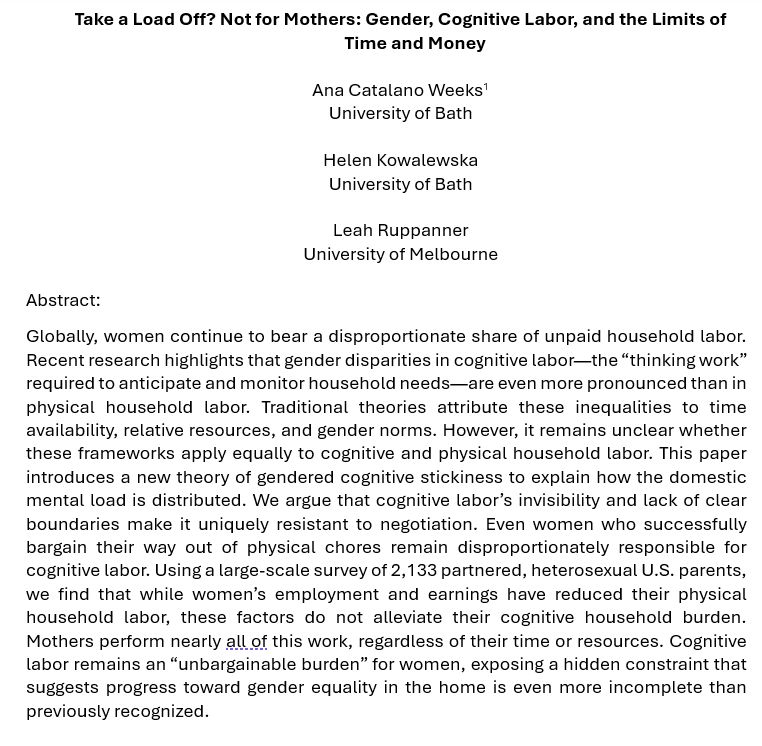
May 6, 2025 at 11:12 AM
🚨New working paper🚨
"Take a Load Off? Not for Mothers"
Time & money help mothers offload physical household labor —but not the mental load. Cognitive labor is an “unbargainable burden.”
w/ @helenkowalewska.bsky.social @leahruppanner.bsky.social
📄 papers.ssrn.com/sol3/papers....
Feedback welcome!
"Take a Load Off? Not for Mothers"
Time & money help mothers offload physical household labor —but not the mental load. Cognitive labor is an “unbargainable burden.”
w/ @helenkowalewska.bsky.social @leahruppanner.bsky.social
📄 papers.ssrn.com/sol3/papers....
Feedback welcome!
We would like to invite you to join the @uniofbath.bsky.social hybrid workshop on gender, parenthood and academic careers, organized by the Departments of Politics and International Studies and Economics. Link to join online in comments, and some in-person spaces available!
Thursday, March 27
Thursday, March 27

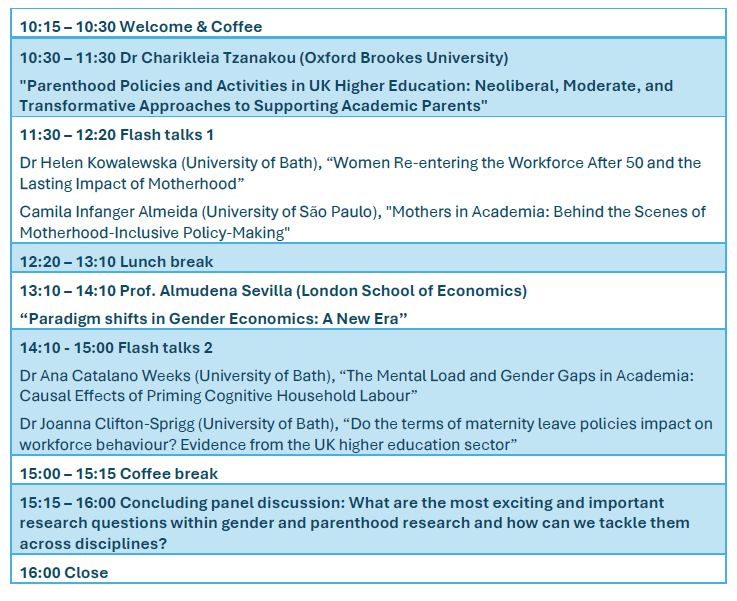
March 12, 2025 at 10:57 AM
We would like to invite you to join the @uniofbath.bsky.social hybrid workshop on gender, parenthood and academic careers, organized by the Departments of Politics and International Studies and Economics. Link to join online in comments, and some in-person spaces available!
Thursday, March 27
Thursday, March 27
Interestingly, in response to the mental load prime fathers but not mothers prefer reduced working hours for their partner. Our findings thus suggest that fathers consider compensating for this cogntive burden at the expense of their spouse’s working time. 8/9
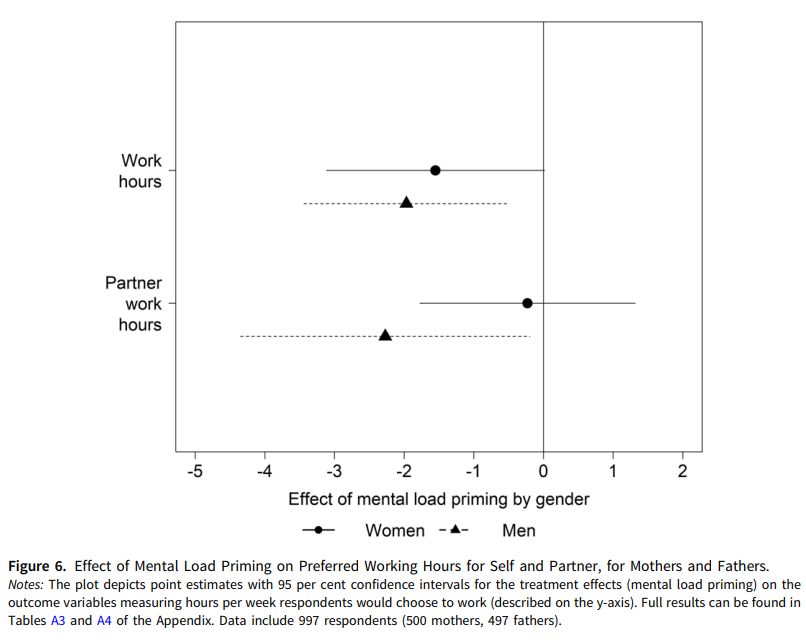
February 21, 2025 at 10:27 AM
Interestingly, in response to the mental load prime fathers but not mothers prefer reduced working hours for their partner. Our findings thus suggest that fathers consider compensating for this cogntive burden at the expense of their spouse’s working time. 8/9
The experimental results show a negative impact of mental load priming on political interest, likelihood of public forms of political participation, vote intention, and interest in opportunities to advance at work. It also negatively impacts preferred working hours. 7/9
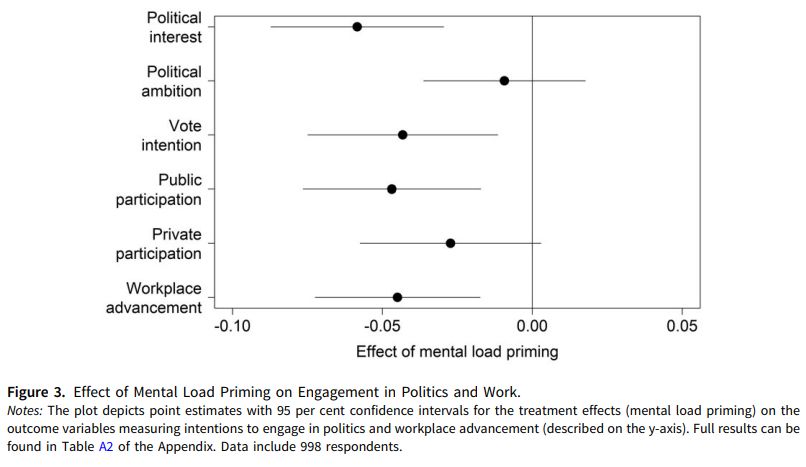
February 21, 2025 at 10:27 AM
The experimental results show a negative impact of mental load priming on political interest, likelihood of public forms of political participation, vote intention, and interest in opportunities to advance at work. It also negatively impacts preferred working hours. 7/9
Mothers are also less likely to believe that the division of mental work in their household is fair, and more likely to express negative emotions such as stress or unhappiness about it. 6/9

February 21, 2025 at 10:27 AM
Mothers are also less likely to believe that the division of mental work in their household is fair, and more likely to express negative emotions such as stress or unhappiness about it. 6/9
Our descriptive data provides confirmation from a new case (the UK) that gender gaps in the mental load are large, and associated with stress and negative emotions for mothers but not fathers. Mothers say they do 78% of the mental load in their households, while fathers report doing 57%. 5/9

February 21, 2025 at 10:27 AM
Our descriptive data provides confirmation from a new case (the UK) that gender gaps in the mental load are large, and associated with stress and negative emotions for mothers but not fathers. Mothers say they do 78% of the mental load in their households, while fathers report doing 57%. 5/9
To test our argument, we rely on original experimental data from employed UK parents w children. We manipulate the salience of individual mental load by asking respondents to think carefully about it, writing a list of mental tasks they are mostly responsible for & asking their feelings about it 4/9

February 21, 2025 at 10:27 AM
To test our argument, we rely on original experimental data from employed UK parents w children. We manipulate the salience of individual mental load by asking respondents to think carefully about it, writing a list of mental tasks they are mostly responsible for & asking their feelings about it 4/9
Instead, self-estimates are closer to measures of the types of mental load that parents are mostly responsible for (daily for mothers, episodic for fathers). This suggests that mothers and fathers are seeing families' total domestic mental work through a prism of their primary tasks. 8/10
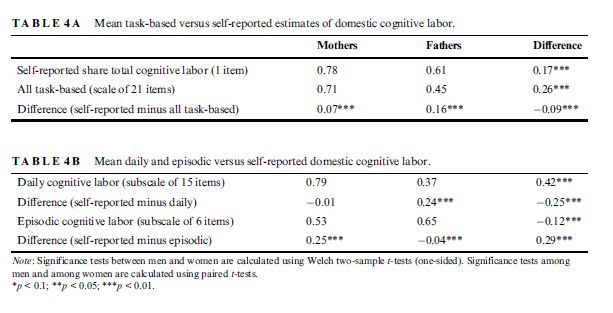
December 12, 2024 at 10:40 AM
Instead, self-estimates are closer to measures of the types of mental load that parents are mostly responsible for (daily for mothers, episodic for fathers). This suggests that mothers and fathers are seeing families' total domestic mental work through a prism of their primary tasks. 8/10
Both mothers and fathers tend to overestimate their work when we compare responses to a question asking them to estimate the total share of mental load in their household they personally do -- fathers more than mothers. And fathers are more likely to view the work as shared. 7/10
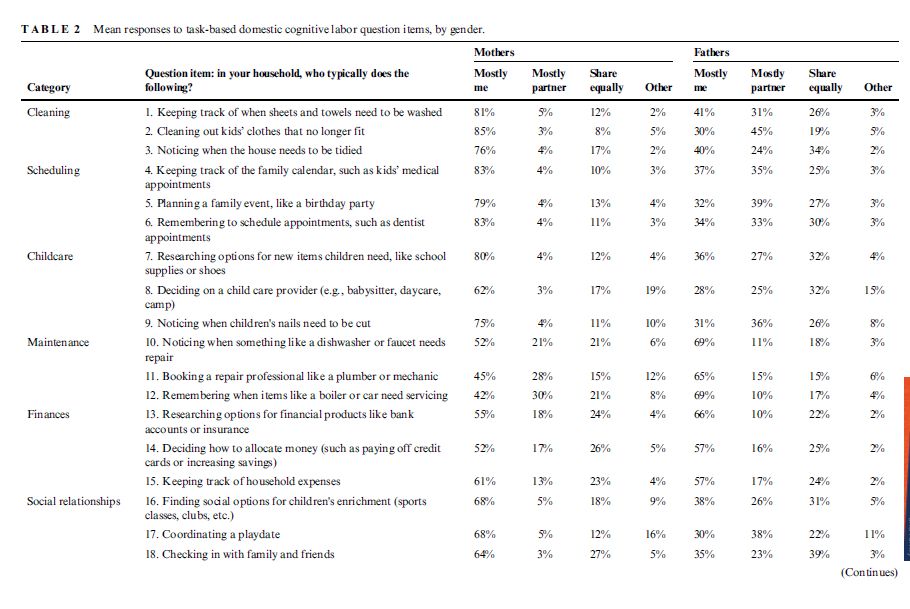
December 12, 2024 at 10:40 AM
Both mothers and fathers tend to overestimate their work when we compare responses to a question asking them to estimate the total share of mental load in their household they personally do -- fathers more than mothers. And fathers are more likely to view the work as shared. 7/10
And there are important differences in the types of mental load that mothers and fathers do. Mothers say they take on 79% of daily tasks (fathers 37%), while fathers claim responsibility for 65% of episodic tasks (mothers 53%). This means that some work is likely duplicated. 6/10
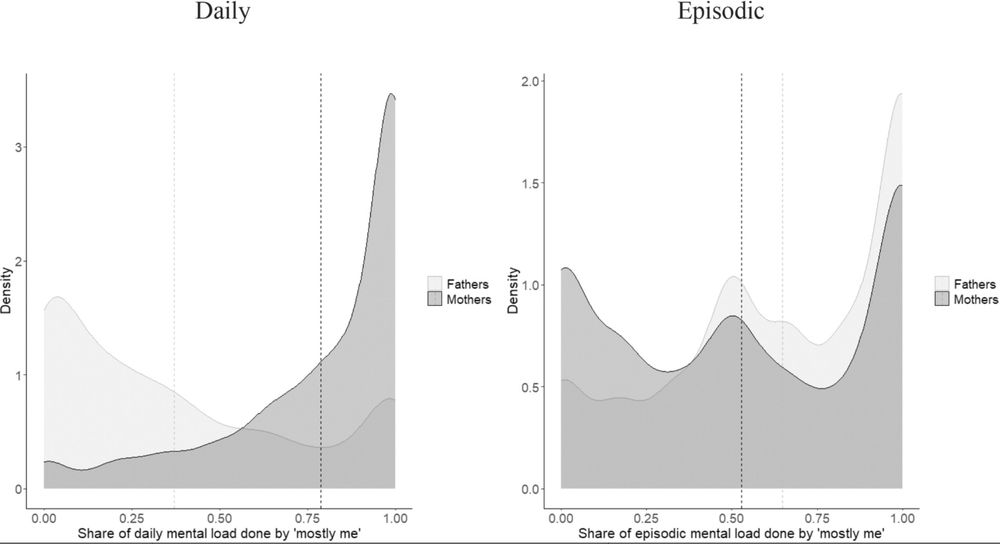
December 12, 2024 at 10:40 AM
And there are important differences in the types of mental load that mothers and fathers do. Mothers say they take on 79% of daily tasks (fathers 37%), while fathers claim responsibility for 65% of episodic tasks (mothers 53%). This means that some work is likely duplicated. 6/10
Using factor analysis, we show that responses to the mental load items form two distinct dimesions, separating into core (cleaning, scheduling, child care, social relationships, food) and episodic (home maintenance, finances) labor. This is true even looking at mothers and fathers separately. 4/10
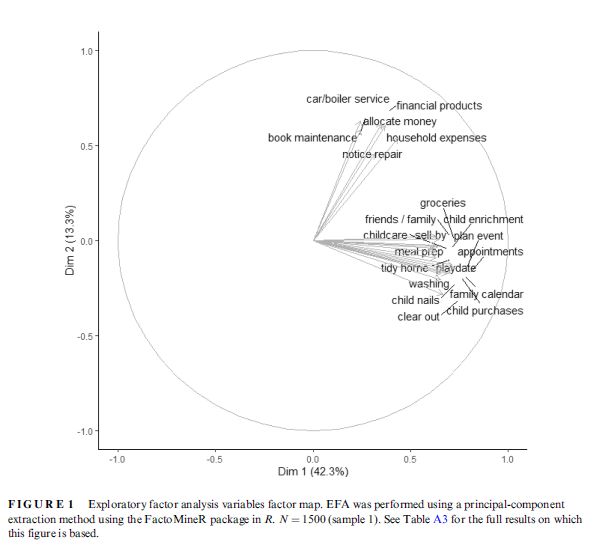
December 12, 2024 at 10:40 AM
Using factor analysis, we show that responses to the mental load items form two distinct dimesions, separating into core (cleaning, scheduling, child care, social relationships, food) and episodic (home maintenance, finances) labor. This is true even looking at mothers and fathers separately. 4/10
We draw on a novel survey battery of 21 distinct measures of domestic cognitive labor from a sample of US parents (n = 3000) selected to be representative of the US population of parents wrt age, race/ethnicity, gender, and education. 3/10
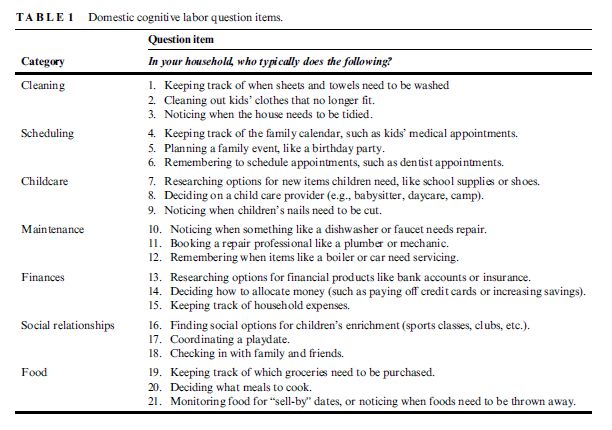
December 12, 2024 at 10:40 AM
We draw on a novel survey battery of 21 distinct measures of domestic cognitive labor from a sample of US parents (n = 3000) selected to be representative of the US population of parents wrt age, race/ethnicity, gender, and education. 3/10
Delighted to share a new publication out today in the Journal of Marriage and Family w/ the brilliant @leahruppanner.bsky.social. In "A typology of US parents’ mental loads: Core and episodic cognitive labor" we assess underlying patterns in the domestic "mental load" among 3,000 US parents. 🧵 1/10

December 12, 2024 at 10:40 AM
Delighted to share a new publication out today in the Journal of Marriage and Family w/ the brilliant @leahruppanner.bsky.social. In "A typology of US parents’ mental loads: Core and episodic cognitive labor" we assess underlying patterns in the domestic "mental load" among 3,000 US parents. 🧵 1/10
Headed home after a great visit to Uppsala to present research on gender quota spillovers into cabinets. Tack 🙏 @ollefolke.bsky.social, the 🌟 grad students who invited me & the whole crew for excellent comments 💡 @ceciliajosefsson.bsky.social @parzetterberg.bsky.social @elinbja.bsky.social


November 15, 2024 at 9:34 AM
Headed home after a great visit to Uppsala to present research on gender quota spillovers into cabinets. Tack 🙏 @ollefolke.bsky.social, the 🌟 grad students who invited me & the whole crew for excellent comments 💡 @ceciliajosefsson.bsky.social @parzetterberg.bsky.social @elinbja.bsky.social
😂 😂 reminds me of this one that went viral a while back!

October 29, 2024 at 7:05 PM
😂 😂 reminds me of this one that went viral a while back!
Happy to share 🆕 research in @sespjournal.bsky.social w a wonderful team 🌟 @pcaravantes.bsky.social, @elombardo.bsky.social, Ana Espírito-Santo, Maria Stratigaki, & Sami Gul.
We ask, when do parties give attention to gender-related political interests, and what determines their positions?
We ask, when do parties give attention to gender-related political interests, and what determines their positions?


October 18, 2024 at 2:38 PM
Happy to share 🆕 research in @sespjournal.bsky.social w a wonderful team 🌟 @pcaravantes.bsky.social, @elombardo.bsky.social, Ana Espírito-Santo, Maria Stratigaki, & Sami Gul.
We ask, when do parties give attention to gender-related political interests, and what determines their positions?
We ask, when do parties give attention to gender-related political interests, and what determines their positions?
Headed home after a great visit to @manchesterup.bsky.social to present new research on femonationalism to the Democracy & Elections network. 🙏 Maria Sobolewska for the invite, and the whole crew for insightful, constructive comments (followed by 🍕)! If interested in the paper lmk, feedback welcome

October 3, 2024 at 9:15 AM
Headed home after a great visit to @manchesterup.bsky.social to present new research on femonationalism to the Democracy & Elections network. 🙏 Maria Sobolewska for the invite, and the whole crew for insightful, constructive comments (followed by 🍕)! If interested in the paper lmk, feedback welcome
Looking forward to visiting Essex today to present new research w @tiffanydbarnes.bsky.social and Giulia Venturini on gender quota laws & executive power.
We find that quotas for parliaments increase women’s representation in governments, although effects are concentrated in low prestige posts.
We find that quotas for parliaments increase women’s representation in governments, although effects are concentrated in low prestige posts.

March 19, 2024 at 10:11 AM
Looking forward to visiting Essex today to present new research w @tiffanydbarnes.bsky.social and Giulia Venturini on gender quota laws & executive power.
We find that quotas for parliaments increase women’s representation in governments, although effects are concentrated in low prestige posts.
We find that quotas for parliaments increase women’s representation in governments, although effects are concentrated in low prestige posts.
It’s here…my book Making Gender Salient: From Gender Quotas Laws to Policy @CUP_PoliSci is out in paperback! 💰
When, and how, do quota laws lead to policy change?
Read more about & reviews in Social Forces Perspectives on Politics @politicsgenderj.bsky.social ➡️ scholar.harvard.edu/anacweeks/book
When, and how, do quota laws lead to policy change?
Read more about & reviews in Social Forces Perspectives on Politics @politicsgenderj.bsky.social ➡️ scholar.harvard.edu/anacweeks/book

January 31, 2024 at 10:23 AM
It’s here…my book Making Gender Salient: From Gender Quotas Laws to Policy @CUP_PoliSci is out in paperback! 💰
When, and how, do quota laws lead to policy change?
Read more about & reviews in Social Forces Perspectives on Politics @politicsgenderj.bsky.social ➡️ scholar.harvard.edu/anacweeks/book
When, and how, do quota laws lead to policy change?
Read more about & reviews in Social Forces Perspectives on Politics @politicsgenderj.bsky.social ➡️ scholar.harvard.edu/anacweeks/book
5) The same is true among fathers. But, since fathers report less responsibility for mental load (they are on the low side of the distribution), the "effect" of mental load tends to be mostly positive. 7/10

December 8, 2023 at 6:46 PM
5) The same is true among fathers. But, since fathers report less responsibility for mental load (they are on the low side of the distribution), the "effect" of mental load tends to be mostly positive. 7/10
4) However, as the fig shows, the pattern reverses after a point. At high shares of mental load, engagement often decreases. For the majority of mothers, mental load tends to depress frequency of political discussion. The mental load can crowd out space for political life. 6/10
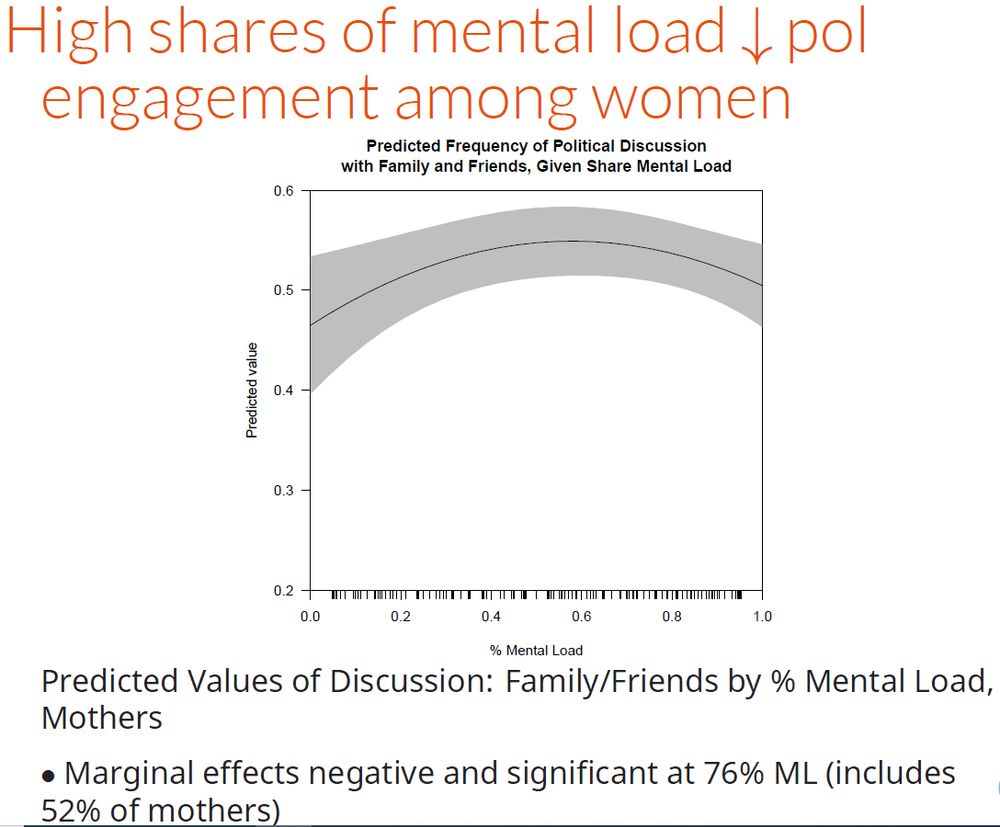
December 8, 2023 at 6:46 PM
4) However, as the fig shows, the pattern reverses after a point. At high shares of mental load, engagement often decreases. For the majority of mothers, mental load tends to depress frequency of political discussion. The mental load can crowd out space for political life. 6/10

